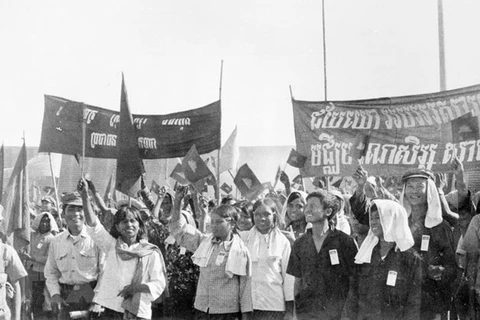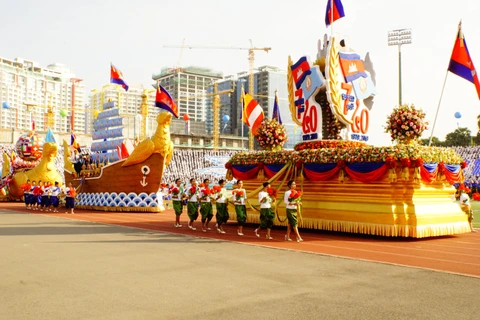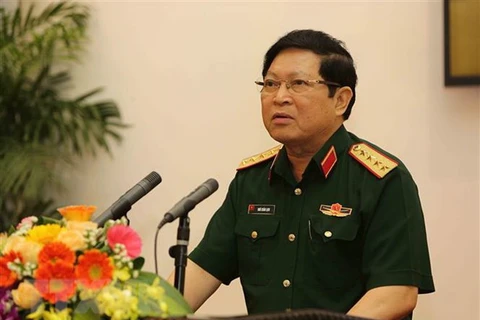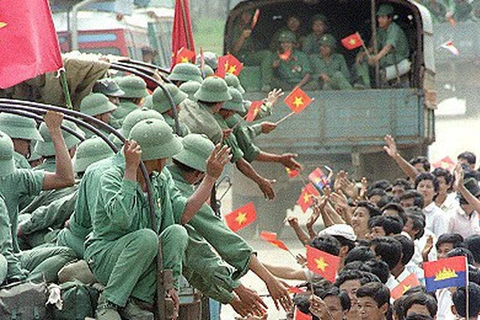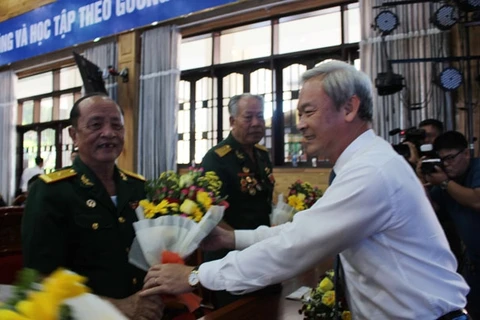 The Cambodian people call Vietnamese volunteer soldiers the "Buddha-sent troops", who helped their country revive (Photo: VNA)
The Cambodian people call Vietnamese volunteer soldiers the "Buddha-sent troops", who helped their country revive (Photo: VNA) Hanoi (VNA) - Khieu Kola, a member of the management board of the Club of Cambodian Journalists, lived through war and the horrible genocidal Khmer Rouge regime more than 40 years ago. Talking to a Vietnam News Agency correspondent in Cambodia, he said he will never forget and is afraid to forget the memories of the terrible life when his country was under the control of the bloodthirsty Pol Pot regime which killed millions of people from April 17, 1975 to January 7, 1979.
He recalled that from mid-1977 to March 1979, he lived in Moung Ruessei of Battambang province, about 250km west of Phnom Penh. That was where he had to exhaust his strength to work and stay far from his hometown in Prey Veng province, which borders Vietnam, after Pol Pot’s Khmer Rouge forces occupied Phnom Penh on April 17, 1975.
Due to disputes within the Angkar – the name the Pol Pot regime used for itself, the forces led by Pol Pot and Nuon Chea considered the people and cadres in the country’s eastern areas as supporters of Vietnam, and even called them “henchmen of the enemy Vietnam”. Therefore, he was among the more than 1 million people expelled from his hometown in Battambang, which is adjacent to Vietnam’s Dong Thap province.
 Cambodia's revolutionary armed force and Vietnamese volunteer soldiers in a training session (Photo: VNA)
Cambodia's revolutionary armed force and Vietnamese volunteer soldiers in a training session (Photo: VNA) At that time, he lived alone, far from his father and four brothers. His mother had passed away in early 1971. On a night in early March 1979, he heard gunshots and rumble of tanks. A friend of his and some young people told him they had heard a Khmer Rouge member say Vietnamese troops had just taken over the Khmer Rouge’s district headquarters in Moung Ruessei town. He told his friend: “In that case, it is good for us. If Vietnamese soldiers have arrived, we will survive. And of course, if not, we will die sooner or later, either being killed or starving to death.”
Khieu Kola said he and his friend agreed not to believe the Khmer Rouge’s propaganda that when the Vietnamese army arrived in Cambodia, there would be no rice, but only rice bran to eat.
The gunshots became louder and louder and seemed only several kilometres away from his village, in the south of Moung Ruessei town. Khmer Rouge troops were afraid and stampeded through the village, trying to force locals to move to forest but no one obeyed them. All Khmer Rouge troops fled and spread rumours that if anyone refused flee, they would be killed by the Vietnamese. But the other villagers didn’t believe them.
The Khmer Rouge themselves were murderers, and locals were the witnesses to their crimes and barbarism.
Khieu Kola said he saw with his own eyes Vietnamese soldiers entering his village. Everyone rejoiced when seeing the tanks of the soldiers.
“Our village is liberated, bravo Vietnamese soldiers!”, everyone cheered in tears, he said, adding that he had felt limitless joy at the time.
“How happy we were to come back to life again,” he added.
 On January 7, 1979, Cambodia's revolutionary and Vietnamese volunteer soldiers liberated Phnom Penh (Photo: VNA)
On January 7, 1979, Cambodia's revolutionary and Vietnamese volunteer soldiers liberated Phnom Penh (Photo: VNA) According to him, at that time, no one dared to publicly talk about the fact that on January 7, 1979, the capital Phnom Penh capital was liberated. That news was spread secretly and many people were killed by the Khmer Rouge when they were found to have spread this news.
Khieu Kola noted after Battambang was liberated, his villagers treated Vietnamese soldiers with kindness because they saw the soldiers sacrifying their lives to liberate Cambodia from the genocidal regime, caring for locals and giving food and pharmaceutical support. The soldiers did not do anything to harm Cambodian people like the Khmer Rouge had said they would.
After the liberation day on January 7, 1979, his first thought was returning to school. However, the resentment against the genocidal regime urged him to join the Kampuchean United Front for National Salvation to fight their remnants from mid-1979 to mid-1980 in Battambang.
Later, he learned his father and three of his brothers were still alive, though his youngest brother had been killed. He decided to return from the military service to Phnom Penh and reunite with his father and eldest brother, who was working at the Cambodian news agency SPK.
A life-changing book
In Phom Penh, he continued his education at a high school. In mid-1981, he enrolled in a six-month Vietnamese-language course at the SPK.
SPK General Director Chey Saphon opened the Vietnamese class, Khieu Kola recounted, adding that he remembered Chey Saphon’s wife giving him a Vietnamese-Khmer dictionary. That dictionary helped improve his knowledge and changed his life from a slave to a soldier, a student, a cadre in charge of youth affairs of the Cambodian People’s Party, a journalist and a writer.
Prime Minister Hun Sen used to say: “I trust Vietnam” and “Had it not been for Vietnam, many more Cambodian people would have died, maybe including my wife and children,” the Tuoi tre (Youth) newspaper issued on June 22, 2001 reported.
Khieu Kola said that for him, the Cambodian Prime Minister’s statement reflected the truth that had it not been for the fact that Vietnamese troops helped the Kampuchean United Front for National Salvation to liberate the country on January 7,1979, the future wouldn’t have come for his country.
The Kingdom of Cambodia has been developing with people’s living standards increasingly improved. Its annual economic growth rate of 7 percent has helped per capita income grow. The change from pain to peace and development of almost all people reminds him of the huge contributions of the Communist Party of Vietnam and Vietnamese soldiers to his country, he noted.
He said the destinies of Cambodia and Vietnam are intertwined. The great President Ho Chi Minh used to say that Vietnam-Cambodia solidarity is sincere and actions-based, not verbal.
Khieu Kola added that to him, Vietnam is a friend, a teacher and a liberation army.
 The great President Ho Chi Minh used to say that Vietnam-Cambodia solidarity is sincere (Source: VNA)
The great President Ho Chi Minh used to say that Vietnam-Cambodia solidarity is sincere (Source: VNA) Military intervention – a must to resolve the genocidal issue
 Journalist Tran Chi Hung (L) talks to Executive Director of the Documentation Centre of Cambodia Youk Chhang (Photo: VNA)
Journalist Tran Chi Hung (L) talks to Executive Director of the Documentation Centre of Cambodia Youk Chhang (Photo: VNA) “The assistance of the Vietnamese army was essential as the Pol Pot regime carried out a bloody massacre of Cambodian civilians. The people who fled to Thailand denounced the scourge of genocide to the world, but no other countries in the region intervened.
“Therefore, the presence of the Vietnamese troops was the important bottleneck removal to put an end to the Pol Pot regime, not by negotiations but military measures.
“I have collected some documents showing that the Amnesty International used to make efforts to negotiate with Pol Pot around 1976 but failed.
“Therefore, the genocidal issue must have military intervention, and only the Vietnamese army could help address this issue.”
- Executive Director of the Documentation Centre of Cambodia Youk Chhang -
January 7 – the date of the Cambodian nation’s revival
“All people and the world acknowledged that without the victory on January 7, 1979, the Cambodian people wouldn’t have revived. And without the assistance of brother and comrade Vietnam, we would have failed to win the ultimate victory. This is the undeniable truth. Thanks to the victory on January 7, 1979, Cambodia has obtained the achievements like at present.
“As a person who experienced the Khmer Rouge genocidal regime, I wish to tell younger generations that they must remember to avoid losing solidarity and maintain peace at all costs, for peace is highly valuable and when solidarity is lost, what will happen in the future is unpredictable. Therefore, January 7 is the date bringing about revival to Cambodia.”
- Deputy Director General of the Cambodian news agency AKP Keo Chandara -

